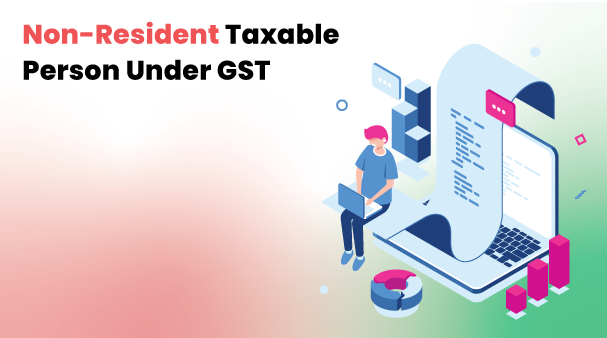Sec 2(77) of CGST Act, 2017 defines a “non-resident taxable person” means any person who occasionally undertakes transactions involving the supply of goods or services or both, whether as principal or agent or in any other capacity, but who has no fixed place of business or residence in India.
Sec 24 of CGST Act, 2017 details the cases where compulsory registration is required wherein clause (v) talks about the non-resident taxable person. Therefore, the minimum threshold limit of Rs. 20 lakh/ 10 lakh is not available to a Non-Resident Taxable Person. Hence, any Non-resident, who is falling under the definition of a Non-Resident Taxable Person, is required to obtain GST Registration irrespective of whether the business is involved in a one-time transaction or frequent taxable transactions.
Section 27 of CGST Act, 2017: Special provisions relating to casual taxable person and non-resident taxable person
(1) The certificate of registration issued to a casual taxable person or a non-resident taxable person shall be valid for the period specified in the application for registration or ninety days from the effective date of registration, whichever is earlier and such person shall make taxable supplies only after the issuance of the certificate of registration:
Provided that the proper officer may, on sufficient cause being shown by the said taxable person, extend the said period of ninety days by a further period not exceeding ninety days.
(2) A casual taxable person or a non-resident taxable person shall, at the time of submission of application for registration under sub-section (1) of section 25, make an advance deposit of tax in an amount equivalent to the estimated tax liability of such person for the period for which the registration is sought:
Provided that where any extension of time is sought under sub-section (1), such taxable person shall deposit an additional amount of tax equivalent to the estimated tax liability of such person for the period for which the extension is sought.
(3) The amount deposited under sub-section (2) shall be credited to the electronic cash ledger of such person and shall be utilized in the manner provided under section 49.
Rule 13. Grant of registration to the non-resident taxable person
(1) A non-resident taxable person shall electronically submit an application, along with a self-attested copy of his valid passport, for registration, duly signed or verified through electronic verification code, in FORM GST REG-09, at least five days prior to the commencement of business at the common portal either directly or through a Facilitation Centre notified by the Commissioner:
Provided that in the case of a business entity incorporated or established outside India, the application for registration shall be submitted along with its tax identification number or unique number on the basis of which the entity is identified by the Government of that country or its Permanent Account Number, if available.
(2) A person applying for registration as a non-resident taxable person shall be given a temporary reference number by the common portal for making an advance deposit of tax in accordance with the provisions of section 27 and the acknowledgment under sub-rule (5) of rule 8 shall be issued electronically only after the said deposit in his electronic cash ledger.
(3) The provisions of rule 9 and rule 10 relating to the verification and the grant of registration shall, mutatis mutandis, apply to an application submitted under this rule.
(4) The application for registration made by a non-resident taxable person shall be 1[duly signed or verified through electronic verification code] by his authorized signatory who shall be a person resident in India having a valid Permanent Account Number.
Rule 15. Extension in period of operation by a casual taxable person and non-resident taxable person
(1) Where a registered casual taxable person or a non-resident taxable person intends to extend the period of registration indicated in his application of registration, an application in FORM GST REG-11 shall be submitted electronically through the common portal, either directly or through a Facilitation Centre notified by the Commissioner, by such person before the end of the validity of registration granted to him.
(2) The application under sub-rule (1)shall be acknowledged only on payment of the amount specified in sub-section(2) of section 27.
Rule 63. Form and manner of submission of return by the non-resident taxable person.-
Every registered non-resident taxable person shall furnish a return in FORM GSTR-5 electronically through the common portal, either directly or through a Facilitation Centre notified by the Commissioner, including therein the details of outward supplies and inward supplies and shall pay the tax, interest, penalty, fees or any other amount payable under the Act or the provisions of this Chapter within twenty days after the end of a tax period or within seven days after the last day of the validity period of registration, whichever is earlier.
Circular No.71/45/2018-GST dt.26.10.2018 has clarified as under
Q1.Whether the amount required to be deposited as advance tax while taking registration as a casual taxable person (CTP) should be 100% of the estimated gross tax liability or the estimated tax liability payable in cash should be calculated after deducting the due eligible ITC which might be available to CTP?
a. It has been noted that while applying for registration as a casual taxable person, the FORM GST REG-1 (S. No. 11) seeks information regarding the “estimated net tax liability” only and not the gross tax liability.
b. It is accordingly clarified that the amount of advance tax that a casual taxable person is required to deposit while obtaining registration should be calculated after considering the due eligible ITC which might be available to such a taxable person.
Q2.As per section 27 of the Central Goods and Services Tax Act, 2017 (hereinafter referred to as the said Act), the period of operation by a casual taxable person is ninety days with provision for extension of same by the proper officer for a further period not exceeding ninety days. Various representations have been received for further extension of the said period beyond the period of 180 days, as mandated in law.
a. It is clarified that in the case of long-running exhibitions (for a period of more than 180 days), the taxable person cannot be treated as a CTP and thus such person would be required to obtain registration as a normal taxable person.
b. While applying for normal registration the said person should upload a copy of the allotment letter granting him permission to use the premises for the exhibition and the allotment letter/consent letter shall be treated as the proper documentation as proof for his place of business.
c. In such cases he would not be required to pay advance tax for the purpose of registration.
d. He can surrender such registration once the exhibition is over.
Conclusion
Hence a person not having a fixed place of business in India can undertake taxable supplies under GST by availing the registration as NRTP for a period not exceeding 180 days. However, he may not be able to import goods as he cannot have IEC the way he can get registration under GST. Also, he needs to evaluate his liability under TDS laws in India, DTAA, income tax, equalization levy, and significant economic presence regulations. These kinds of transactions are prevalent in Pharma, Information Technology, and Auto and one needs to be watchful in complying with these onerous regulations, which appear to be economically unviable.

